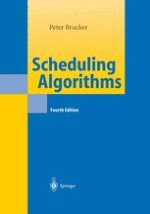2004 | OriginalPaper | Buchkapitel
Due-Date Scheduling
verfasst von : Professor Dr. Peter Brucker
Erschienen in: Scheduling Algorithms
Verlag: Springer Berlin Heidelberg
Enthalten in: Professional Book Archive
Aktivieren Sie unsere intelligente Suche, um passende Fachinhalte oder Patente zu finden.
Wählen Sie Textabschnitte aus um mit Künstlicher Intelligenz passenden Patente zu finden. powered by
Markieren Sie Textabschnitte, um KI-gestützt weitere passende Inhalte zu finden. powered by
New production technologies like “just-in-time” production lead to special scheduling problems involving due dates d i . Contrary to classical scheduling problems where the objective function simply involves lateness L i = C i − d i or tardiness T i = max{0, C i − d i } penalties, earliness E i = max{0, d i − C i } is now also of importance. Objective functions such as Σ w i | L i | and Σ w i L i 2 are typical of “just-in-time” situations. Note that L i = T i + E i and L i 2 = T i 2 + E i 2. From the practical and theoretical point of view, situations in which all due dates are equal are of importance. This due date d may be a given parameter of the problem or it may be a variable, i.e. we are interested in an optimal due date d opt with respect to the objective function. To indicate these special situations we add d or d opt to the job characteristics of the problem. If the due date is a variable, then we may add due-date assignment costs w d · d to the objective function.
